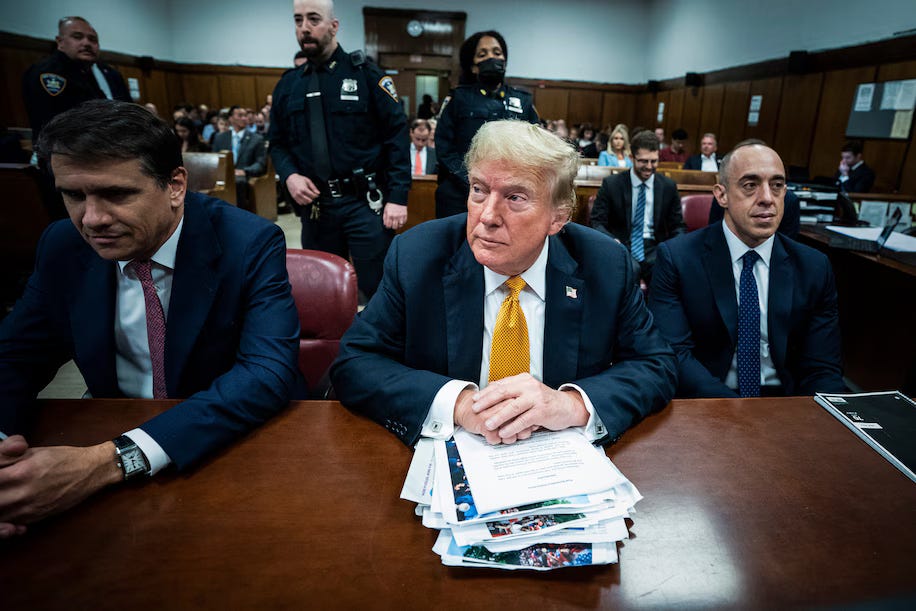{Breaking News}: Trump Found Guilty on All 34 Counts in New York Hush Money Trial
Sentencing is scheduled for 11 July, at which time it will be determined whether he receives prison time or is released on probation.

Historic “GUILTY” Verdict
Former President Donald Trump has been found guilty on all 34 felony counts of falsifying business records to conceal a hush money payment to adult-film actress Stormy Daniels. This landmark verdict makes Trump the first former U.S. president to be convicted of a crime, a development that could significantly impact the upcoming November election as Trump seeks another term in office.
Jury Deliberations, Verdict, and Sentencing
After more than five weeks of testimony and expansive—and presumably expensive—arguments, along with some flashpoints during the trial, the 12-person jury reached its unanimous decision in just over a day. Under New York law, the jury verdict, whether guilty or not guilty, must be unanimous, and a hung jury could have potentially led to a mistrial. The charges against Trump centered on falsifying business records to conceal the $130,000 reimbursement payment made by his former attorney Michael Cohen to Stormy Daniels.
Trump faces a potential sentence ranging from probation to four years in prison, though his age and lack of prior criminal record might result in a lighter sentence. Sentencing is scheduled for 11 July, when it will be determined if he receives prison time or is placed on probation.
Trump's Reaction and Ongoing Campaign
Despite the conviction, Trump remains defiant, continuing to campaign for the presidency. He left the courtroom grim-faced but declared his innocence outside, insisting that the real verdict will be decided by the voters on November 5th. He is expected to appeal the verdict, and his campaign activities, somewhat constrained by the requirement of his personal presence during the trial and jury deliberations, will now proceed as planned.
Prosecution's Case
The prosecution argued that Trump orchestrated a "long-running conspiracy to influence the 2016 election" by falsifying business records to conceal the hush money payment as legal fees. They presented it to the jury as a case of “conspiracy, crime, and cover-up.” The prosecution emphasized that the payments were misrepresented to hide a second crime, which they alleged was a violation of state election law. The jury had to decide—on the questions of fact, not of law—whether Trump’s actions constituted a felony aimed at unlawfully impacting the election.
Defense's Argument
Trump's defense team argued that the payments to Cohen were legitimate legal fees and attacked Cohen's credibility as the prosecution's key witness. They portrayed Cohen as a liar motivated by vengeance, pointing out his history of crimes, including lying to Congress. The defense contended that Cohen's testimony alone could not support a conviction beyond a reasonable doubt.
Trial Highlights
The trial, which began in mid-April, featured graphic testimony from Stormy Daniels, the former adult-film actress, about her alleged sexual encounter with Trump and detailed descriptions of tabloid practices to suppress scandalous stories. Cohen testified that he arranged the payment at Trump's direction, but his credibility was repeatedly challenged and attempted to be impeached by the defense. The trial often veered into sordid details, providing jurors with an inside look at efforts to manage and conceal damaging stories.
What perhaps swayed the jury to a quick unanimous verdict was the argument that Cohen would have no personal motivation to make the $130,000 payment, and that the only person who would potentially benefit from the sordid sequence of events was none other than Trump. To keep the jury focused, the prosecution frequently asserted that it was Trump, not Cohen, who was on trial here in Manhattan, as Cohen had already paid for his sins, felonies, and misdemeanors by serving prison time.
Sentencing
Trump’s sentencing is scheduled for July 11, 2024. Each felony count carries a maximum sentence of four years in prison. However, given that Trump is a first-time offender and the crime is non-violent, experts suggest he is more likely to receive a lighter sentence, such as probation or home confinement. If he does receive jail time, it is expected to be less than a year.
Interim Period
It is unlikely that Trump will be remanded while awaiting sentencing. Even if remanded, he could likely secure bail during the appeal process. His legal team has indicated plans to appeal the conviction, potentially delaying any jail time until after the appeal is decided.
Secret Service Considerations
If Trump were to be sentenced to jail, logistical questions arise regarding his Secret Service protection. Creative solutions, such as confinement in a secure facility like a hotel wing or military base, might be considered to ensure his safety.
Political Implications
Interestingly, under the US federal law and the Constitution, despite the conviction, Trump remains eligible to run for president. The U.S. Constitution does not preclude a convicted individual from holding the office of the President, meaning Trump could theoretically campaign and even serve as president if elected, regardless of his legal status.
Summing Up: Awaiting Further Developments
In summary, while Trump faces potential jail time, the exact outcome will depend on the sentencing decision in July and the results of any appeals. This historic conviction will undoubtedly reverberate through the political landscape and the upcoming presidential election, making it a developing story to watch closely.
Stay tuned.





ਅਗਹੁ ਦੇਖੈ ਪਿਛਹੁ ਦੇਖੈ ਤੁਝ ਤੇ ਕਹਾਂ ਛਪਾਵੈ ।।